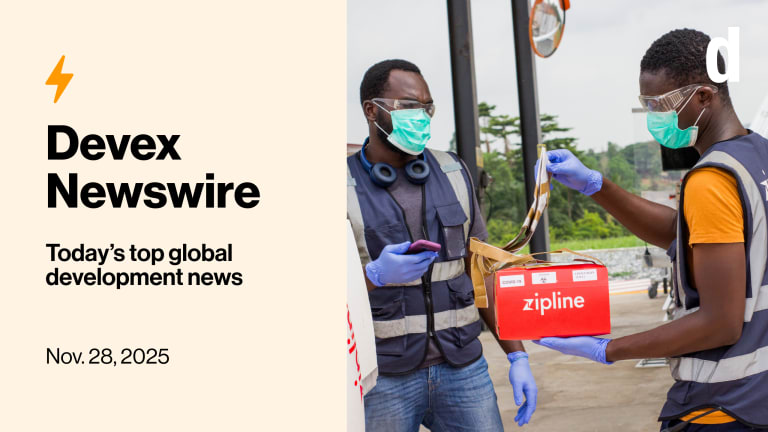
The U.S. aid freeze left front-line organizations struggling — and looking to other sources, such as philanthropy, to fill the gap. It’s exposed the fragility of global aid’s reliance on U.S. policy, fueling calls to decolonize aid and rethink long-term funding models.
Also in today’s edition: Mark Kevin Lloyd issues a warning at USAID.
This is a preview of Newswire
Sign up to this newsletter for an inside look at the biggest stories in global development, in your inbox daily.
+ Why is development so important for global security? Join us today, Feb. 19, at 10 a.m. ET for a post-Munich Security Conference briefing where we'll discuss this and how shifting geopolitics are shaping foreign aid and development investments. Can’t attend live? Register anyway and we’ll send you a recording.
Shaky foundations
Weeks after U.S. President Donald Trump froze foreign aid, The Rockefeller Foundation finally responded. In a vague statement, the foundation’s president, Rajiv Shah, praised USAID’s legacy and promised: “The Rockefeller Foundation is dedicated to doing our part.” But with billions of dollars on hold, vague isn’t enough.
After the gutting of foreign aid, most major philanthropies remain silent. Bloomberg Philanthropies pledged to fill the Paris Climate Agreement gap, the Robert Wood Johnson Foundation condemned Trump’s cuts, and the Novo Nordisk Foundation stayed out. Rockefeller’s response sparked frustration: “You have $6.2 billion in assets. What specifically are you doing to meet this moment and catalyze change?” asked a LinkedIn commenter.
Trump’s hostility to foreign aid isn’t new — his 2018 budget wanted to slash it by a third. This time, he acted almost overnight. “All indicators were pointing to the fact that it was going to be a lot worse,” says philanthropy consultant Tatyana Margolin. Foundations aren’t built for emergency response, but inaction now means collapse for front-line organizations, Devex contributor Lauren Evans writes.
Can philanthropy fill the gap? No. USAID spent $40 billion in 130 countries in 2023, far beyond what private philanthropy can match. But it isn’t just about replacing lost aid — it’s about rethinking the system. Calls to decolonize aid were growing even before this crisis. The long-term shift? More flexible, trust-based funding and bigger risks.
“We have relied on one country, one group of countries, one person, to bankroll an entire system. And when they change their mind, there’s collateral damage everywhere,” says Solange Baptiste of ITPC Global.
Read more: US foreign aid has collapsed. How should philanthropy respond? (Pro)
+ Not yet a Devex Pro member? Start your 15-day free trial today and check out all the exclusive content available to you.
Free speech?
Mark Kevin Lloyd is back at USAID — warning staff that talking to the press could get them fired. “Unauthorized engagement externally with the press or others is subject to discipline, including dismissal,” he wrote in a Feb. 13 memo obtained by Devex. Now performing the duties of assistant administrator for USAID’s Bureau of Global Health, he replaces Dr. Atul Gawande.
Lloyd dismissed media reports on the State Department’s waiver system as a “false narrative,” insisting lifesaving aid “continued uninterrupted and was never paused.” But USAID’s payment system, Phoenix, has been down, stalling funds. One Kenyan partner organization, despite a PEPFAR waiver, has had “no funds to operate.”
Rep. Joaquin Castro confirmed the funding freeze: “The Phoenix system is not operating. … No one is getting funded even though the waiver has been granted.”
This isn’t Lloyd’s first USAID stint. Appointed in 2020 during the first Trump administration, he faced backlash for calling Islam a “barbaric cult” and and linking former U.S. President Barack Obama to the Muslim Brotherhood. His social media posts target abortion, LGBTQ+ rights, and encourage deportations, with comments comparing Democrats to Nazis and referring to Kamala Harris as a parasite.
Despite his gag order, Lloyd has championed “free speech” online, posting quotes from Elon Musk and others against censorship. CNN also uncovered a 2010 remark where he suggested armed revolt if the Tea Party lost: “If it isn’t the ballot, at some point, it will be a bullet.”
USAID and Lloyd have not responded to Devex’s requests for comment.
Read: USAID staff warned — talk to the press, risk being fired
Chilling effect
The temperature in Geneva hovered a couple of degrees above freezing at the break of day Tuesday. But don’t expect too much relief from the chill in the typically cozy confines of the U.N. Refugee Agency’s headquarters.
In response to the U.S. foreign aid freeze, the UNHCR has turned down the building thermometer, shut off the hot water in its bathrooms, and pressed ahead with an ongoing transition to LED lighting, according to an internal memo titled “Subject:Update on Cost-Saving Measures at HQ.”
The measures may seem pretty insignificant, given the cataclysmic impact the Trump administration’s foreign aid freeze is having on tens of thousands of aid and development workers who are losing their jobs and the millions of aid recipients who are losing access to lifesaving medicines and services.
But it shed light on the myriad ways international aid providers are looking for ways to trim costs, Devex Senior Global Reporter Colum Lynch tells me. Among the other measures: “We are reducing the frequency of cleaning and services and have stopped all work on the building,” it states. Even parking privileges were on the chopping block, as staffers were warned that the agency is “consolidating parking space availability for colleagues.”
“We apologize for any inconvenience this might cause you and thank you for your understanding and cooperation,” the memo stated.
A spokesperson for UNHCR declined to comment on the memo, telling Colum: “As a general principle we do not comment on internal documents. But I can confirm that UNHCR has taken a series of precautionary measures to reduce non-essential expenditures and minimize the impact of the millions of refugees and forcibly displaced people we assist around the world.”
Counting the costs
It’s been a long hard month since the Trump administration set its sights on USAID, unleashing a funding freeze that’s thrown global aid into chaos — from supply chains to emergency response.
Devex analyst Miguel Antonio Tamonan has been tracking the fallout daily, crunching the numbers to reveal the full scale of the damage. His latest dive into OECD’s Creditor Reporting System paints a stark picture: the U.S. is the world’s biggest bilateral donor, yet its foreign aid priorities are now hanging by a thread.
Here’s a taster of what Miguel found:
• Of the $223.3 billion in total official development assistance from Development Assistance Committee members, the U.S. contributed $64.7 billion — almost 30%.
• Subtracting humanitarian relief, admin costs, and in-donor refugee costs, USAID had $27.5 billion for sector-specific programs. The top priority in 2023 was government and civil society, which received $13.6 billion, up 25.8% from 2022.
• U.S. funding comprised over 50% of global ODA for 17 key areas in 2023, including malaria control, narcotics control, and tuberculosis programs. If the freeze continues, some funding could vanish entirely, threatening progress decades in the making.
Read: Which sectors are most vulnerable to US aid cuts (Pro)
+ To keep up to date with global development's latest funding opportunities, in-depth news, and analysis, sign up to Devex Money Matters.
In other news
Rebuilding Gaza after the 15-month Israel-Hamas conflict will cost over $50 billion, according to an assessment by the U.N., EU, and World Bank. [Al Jazeera]
Rwanda suspended development ties with Belgium, accusing it of sabotaging the country’s access to financing amid tensions over the conflict in eastern Congo. [Bloomberg]
The Japan International Cooperation Agency announced a $1 billion contribution to support the Inter-American Development Bank’s private sector arm. [Reuters]
Update, Feb. 19, 2025: This article has been updated to clarify the weather condition in Geneva on Tuesday.
Sign up to Newswire for an inside look at the biggest stories in global development.








